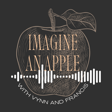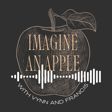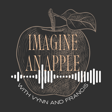Podcast Introduction
00:00:00
Speaker
Hello and welcome to Imagine an Apple, the podcast about our inner mental worlds.
00:00:05
Speaker
My name is Francis and today our guest is Mike Johnson.
00:00:09
Speaker
Also with me is Vin, my co-host.
Exploring Inner Experiences and Phenomenology
00:00:14
Speaker
So Mike is formerly worked at the Qualia Institute but now is currently doing other stuff but
00:00:22
Speaker
Today we will be interviewing Mike about his internal experiences, specifically about the stuff that he specializes in, Tana, qualia, and active influence among some of the things we'll be talking about.
Understanding Individual Phenomenology
00:00:45
Speaker
So what we're interested in talking about today is inner experiences and how you might experience some of these phenomenal, your phenomenology, whether it's more visual or auditory or olfactory.
00:01:01
Speaker
And I was wondering if you have
00:01:04
Speaker
special kinds of phenomenology that you think are uncommon in general populations?
00:01:09
Speaker
That's a really good question.
00:01:13
Speaker
So I would open with, you know, no one exactly knows how common or uncommon their phenomenology is.
00:01:21
Speaker
but we can sort of analyze base rates and different sort of physiologies.
00:01:30
Speaker
And yeah, I was actually talking about this with a friend today.
00:01:35
Speaker
And I was saying, well, you know, I think that I have...
00:01:40
Speaker
a somewhat unusual phenomenology.
00:01:44
Speaker
And they were saying, okay, cool, Mike, why do you think that?
00:01:48
Speaker
What makes you say that?
00:01:49
Speaker
And I actually wrote a decently long article about something very similar.
Autism and Dimensionality
00:02:00
Speaker
autism as a disorder of dimensionality and it basically makes the case that uh people vary in a in a very interesting way so part of um physiology is understanding dimensions of natural variation um and uh kind of the the interesting dimensions that give rise to to interesting personality types or in this sense uh interesting phenomenologies and um
00:02:28
Speaker
my thesis in that piece was that people vary in terms of literally how many neurons they have in a unit volume of brain mass.
00:02:41
Speaker
And this is based on some research, some autopsies of children with autism, basically that
00:02:52
Speaker
And this is actually a pretty crazy result.
00:02:57
Speaker
They did autopsies and found that autistic children had on average 67% more neurons in the same volume of prefrontal cortex, which is a lot.
00:03:12
Speaker
It's not just 1% or 10%, it's 67% more.
00:03:17
Speaker
So that got me thinking about, okay, well, what does that mean?
ASICs vs. FPGAs: A Brain Analogy
00:03:23
Speaker
And can we sort of derive interesting things from this sort of one factor model?
00:03:30
Speaker
And my thesis was that, yes, we can.
00:03:34
Speaker
And I guess I'd sort of frame that as if you take a, so everyone's kind of familiar with how LLMs work, at least a little bit these days.
00:03:46
Speaker
and sort of the challenges of if you sort of have a certain number of parameters in your LLM, then you have certain alignment challenges.
00:03:55
Speaker
Certain things work to align the LLM, and certain things maybe don't work as well.
00:04:02
Speaker
And in this case, basically, you'd be jacking the parameter count by 67%.
00:04:11
Speaker
And so you get into a different kind of
00:04:15
Speaker
different kinds of failure mode.
00:04:17
Speaker
And I promise this is answering your question.
00:04:23
Speaker
So the observation that I made in the piece was that the natural sort of circuitry that evolution gives us
00:04:34
Speaker
sort of has pre-built optimization into it, that this is a very finely tuned evolved circuit that produces a specific result.
00:04:48
Speaker
But basically, if you make these networks thicker, if you take an optimized circuit,
00:04:55
Speaker
I don't know if you're familiar with in computing, there are ASICs, application-specific integrated circuits, basically a custom chip for a custom task.
00:05:06
Speaker
And it does one thing, but it does with this one thing really well.
00:05:10
Speaker
So like a Bitcoin miner.
00:05:12
Speaker
And then you have FPGAs, Field Programmable Gate Arrays, that basically it can be anything.
00:05:20
Speaker
This is a chip that you can reprogram at the hardware level.
00:05:23
Speaker
You can make it look like any other chip, or you can sort of solve any problem with hardware, but you actually have to do the programming.
00:05:31
Speaker
And so if this sort of autists have more thicker networks, we can say, more neurons and more connections between neurons, then their circuits are more like an FPGA than an ASIC.
00:05:50
Speaker
more like a general unoptimized network than sort of a sleek, highly tuned, thin network.
00:06:02
Speaker
So in this, so I'll pause a little bit.
00:06:04
Speaker
Does that all make sense?
00:06:06
Speaker
So I'm a little bit lost at the moment.
00:06:08
Speaker
I'm not entirely sure what an ASIC is or the other thing that you mentioned.
00:06:14
Speaker
and not entirely sure how emotion, how this relates to emotions and qualia.
00:06:23
Speaker
expand a little bit more what you mean by dimensionality.
00:06:26
Speaker
What does that mean for autistic brains to have different dimensionality?
00:06:31
Speaker
Yeah, yeah, you bet.
00:06:33
Speaker
So an ASIC is a specialized chip.
00:06:39
Speaker
It's very optimized.
00:06:40
Speaker
And an FPGA is a much more generalized chip.
00:06:44
Speaker
It's not optimized, but you can program it yourself.
Sensory Variability in Autism
00:06:47
Speaker
And the sense is that
00:06:49
Speaker
If a brain has sort of extra neurons in it, it's more like an FPGA than an ASIC.
00:06:56
Speaker
It has a lot of potential in it, but it's not particularly optimized.
00:07:02
Speaker
But what is it optimized to do?
00:07:05
Speaker
So we generally, like a lot of circuits are pretty optimized in the brain.
00:07:11
Speaker
Like we have circuits to detect faces.
00:07:13
Speaker
We have circuits to detect noises and scary noises.
00:07:16
Speaker
We have circuits to figure out which foods are tasty and which are not.
00:07:22
Speaker
And the thesis is that people on the spectrum, on the autism spectrum, might
00:07:30
Speaker
have to do a little bit of post-production tuning on their circuits.
00:07:35
Speaker
They're not so optimized because it's just they have more neurons than what evolution was planning for.
00:07:45
Speaker
So does this translate to a different inner experience, so to speak?
00:07:49
Speaker
Do they have qualia that might be different from someone who's not autistic?
00:07:53
Speaker
Yeah, you know, that's, I want to say yes.
00:07:57
Speaker
And I think that part of that is
00:08:01
Speaker
every ASIC is going to be this.
00:08:04
Speaker
Every highly evolved circuit is going to be very similar.
00:08:09
Speaker
But every FPGA is going to be wired up a little bit differently.
00:08:15
Speaker
And so you're going to get a lot more diversity in the solutions that the brain finds.
00:08:24
Speaker
Oh, so I guess this would like I don't particularly make autism part of my identity or not part of my identity.
00:08:33
Speaker
It's just a it's just the word.
00:08:35
Speaker
But I do think that
00:08:38
Speaker
like this, I sometimes interact with the community and there's this focus on neurodivergence.
00:08:46
Speaker
And I think that's interesting because it's like everyone with autism is going to be different than people without autism, but also different from other people with autism.
00:09:00
Speaker
If you have a very small circuit, there's one way to make it work.
00:09:05
Speaker
If you have a very big circuit, maybe there are 100 different ways to make it work.
00:09:09
Speaker
And maybe you found solution 57, whereas someone else found solution 62.
00:09:13
Speaker
And I think that may show up in how sensory experiences present to people.
00:09:25
Speaker
So here you're talking about the phenomenology of direct sense.
00:09:28
Speaker
So how people, when they're actually seeing something, experience seeing it.
00:09:32
Speaker
Is that what you mean would vary?
00:09:35
Speaker
I think that you actually get different results in a phenomenology.
00:09:41
Speaker
And in terms of the kind of more imaginative internal phenomenology, so like inner imagination and inner voices, that kind of thing, do you think use of those would vary or is that like a separate question?
00:09:56
Speaker
I think it's all linked.
00:09:58
Speaker
So yeah, I would also apply this to that frame as well.
00:10:02
Speaker
So imagination has a practice component as well.
00:10:07
Speaker
And for many people, they engage in some kind of attentional training.
00:10:11
Speaker
Meditation being a pretty good example of this, but other techniques, Alexander Tick, various other things also come into play.
00:10:19
Speaker
I'm aware that you are a meditator, am I correct on this?
00:10:23
Speaker
Yeah, that's right.
00:10:24
Speaker
Do you think that your meditation practices lead to different inner experiences, whether it regards to your imagination or how you experience qualia differently?
Meditation's Impact on Internal Experiences
00:10:35
Speaker
Yeah, I would say so.
00:10:39
Speaker
If I had to say some words on that, I do think that just practice looking at things makes them more clear.
00:10:47
Speaker
And I would also say that, just like you mentioned, Alexander Technique, and I guess, especially lately, after my latest piece on vessel computation, I've been sort of practicing just
00:11:02
Speaker
there's this phrase, opening the hand of thought.
00:11:06
Speaker
And I think that practicing that is a very powerful move.
00:11:12
Speaker
And often there are clenches and clamps in our phenomenology and just practicing, OK, would it be so bad?
00:11:22
Speaker
Would anything bad happen if I just released and just tried to be an open experience?
00:11:28
Speaker
And I think that's very, very powerful.
00:11:31
Speaker
Opening the hand of thought.
00:11:32
Speaker
I really liked that phrase.
00:11:33
Speaker
Um, you mentioned vasocomputation, which is something that I've seen you written about.
00:11:37
Speaker
Can you tell us more about what vasocomputation is and how that relates to Tana, which you mentioned quite a lot in your blog post?
00:11:47
Speaker
a bit afraid that I'm kind of throwing listeners into the deep end here.
00:11:54
Speaker
We'll unpack it once a bit.
Vasocomputation and Buddhist Phenomenology
00:11:58
Speaker
So I wrote this piece called Principles of Vaso Computation.
00:12:04
Speaker
It's basically a unification of three or four domains.
00:12:08
Speaker
And the first domain is Buddhist phenomenology.
00:12:12
Speaker
And especially this term that the Buddhists call tanha.
00:12:16
Speaker
And this is often translated as grasping or thirst or clenching or desire.
00:12:24
Speaker
and uh according to the buddhists it's um responsible for you know maybe 90 of of all sort of moment by moment and so so it's kind of it's a big deal it's important just to i think just to make it clear what you mean by tan can you when you experience it yourself can you describe how that comes to you do you get like is it like a verbal thought or do you
00:12:50
Speaker
What's the actual experience of having Tanha?
00:12:53
Speaker
Yeah, so there's, I would call it a contraction in awareness.
00:12:59
Speaker
And there's both the general contraction and a contraction around a specific part of awareness.
00:13:07
Speaker
And you can kind of gauge how flat your phenomenology is, in a way.
00:13:15
Speaker
And when Tanha is going,
00:13:20
Speaker
your phenomenology feels more lumpy, I guess I would say, for lack of a better word.
00:13:26
Speaker
So how does Tanha relate to this thing called free energy and active inference?
00:13:33
Speaker
And can you help unpack those terms and what they mean?
00:13:38
Speaker
So principles of vessel computation connects three domains.
00:13:44
Speaker
And one is Buddhist phenomenology.
00:13:46
Speaker
And the second domain is the active inference framework, or the more full mouthful there would be the free energy principle active inference framework.
00:13:59
Speaker
And so this was developed by Fristen and others.
00:14:04
Speaker
And it's basically a framework how the brain is a prediction machine, and we sort of hallucinate our reality.
00:14:11
Speaker
Rao is trying to predict our sensations.
00:14:14
Speaker
And we live in that story, we can say.
00:14:19
Speaker
And active inference is another layer on top of this that says, not only do we make these predictions all the time, not only do we try to predict our sensations, but sometimes we predict
00:14:35
Speaker
false sensations and we hold these predictions until we act in the world to make them true.
Active Inference Explained
00:14:42
Speaker
So this is a very subtle, important thing, I think, that, for example, if I'm thirsty, maybe I'll predict, oh, I'm not thirsty.
00:14:55
Speaker
I have the taste of water in my mouth and down my throat.
00:14:58
Speaker
Of course, that's not true.
00:15:00
Speaker
That's a false prediction.
00:15:01
Speaker
But I'll hold it in my mind until I go, I pour myself a glass of water and take a drink.
00:15:09
Speaker
Then I can release the prediction.
00:15:11
Speaker
Or if I turn the burner on on the stove, I'll hold the prediction that I need to turn off the burner until I turn off the burner.
00:15:19
Speaker
So I sort of keep track of the state of things by active inference.
00:15:24
Speaker
So yeah, this is a really cool framework.
00:15:30
Speaker
I was going to say, so the Burnham one was super interesting.
00:15:33
Speaker
So there you said, once you've turned it on,
00:15:37
Speaker
you would have like in your present mind like a prediction that you need to turn off rather than predicting that it will turn off?
00:15:45
Speaker
Yeah, there's some kind of accounting system in the brain where, okay, you know, I know
00:15:52
Speaker
Now I'm turning this on and I need to sort of hold this state in my brain.
00:15:59
Speaker
And I know that I can stop holding the state once I turn it off.
00:16:04
Speaker
So we can sort of frame that as what I'm holding is the prediction that the burner is off.
00:16:12
Speaker
I have a question about this because you say that making a prediction
00:16:18
Speaker
example, that you are not thirsty is said to be a false prediction according to this framework.
00:16:24
Speaker
Whereas I typically interpret my desire to grab a glass of water to be a type of wanting, it's a type of desire, rather than thinking of it as a false prediction which I hold true until it becomes true by way of my acting in the world.
00:16:40
Speaker
And is there a difference?
00:16:41
Speaker
Is there a difference between falsely predicting and simply
00:16:46
Speaker
wanting or desiring, or are these like functionally the same thing?
00:16:50
Speaker
Same phenomena, same mechanism for achieving?
00:16:53
Speaker
Yeah, that's a good question.
00:16:54
Speaker
And I would say that with it, it of course depends on the mechanism.
00:16:59
Speaker
And with some mechanisms, it's implemented in such a way that they would be the same.
00:17:05
Speaker
And some mechanisms it would not be.
00:17:07
Speaker
So I guess this would be an argument for sort of dropping down and
00:17:12
Speaker
paying attention to implementation, which is the third domain, of course.
Tanha and Unskillful Inference
00:17:18
Speaker
So can you tell us more about Buddhist conceptions of Tana and how that might have influenced your development of your framework in
00:17:29
Speaker
baso-computational theories?
00:17:34
Speaker
So I want to give a shout out to both Romeo Stevens and Nick Camerado.
00:17:41
Speaker
They've really done a lot of foundational work on thinking about Tanha.
00:17:47
Speaker
Novel translations of Tanha are like sorting through, okay, what's a good translation?
00:17:53
Speaker
And first-person exploration that, you know, can we see this?
00:17:59
Speaker
Can we put a time frame on?
00:18:01
Speaker
You know, does it happen within 25 to 50 milliseconds or 100 milliseconds or whatnot?
00:18:10
Speaker
So they've done really, really great work.
00:18:15
Speaker
I think so my focus is generally sort of connecting these domains and saying, okay, this Buddhist tanha is sort of using this active inference system in an unskillful way, trying to control sensations in ways that don't make sense in some sort of like
00:18:42
Speaker
There are, in programming, we can talk about type errors, trying to, you know, add two letters together or multiply two letters together or something like that.
00:18:52
Speaker
It's just like, that's not the sort of thing you do with letters.
00:18:56
Speaker
And the tanha as unskillful active inference frames as the brain engages in a lot of that stuff when it tries to manipulate sensations, that it's often unskillful in the ways that it tries to...
00:19:12
Speaker
make predictions about sensations.
00:19:14
Speaker
And that in a moment by moment sense, this happens a lot.
00:19:19
Speaker
And this really adds up to like a lot of sort of submerged unpleasantness in your moment to moment experience.
00:19:29
Speaker
And that, I mean, the Buddhists say that, and if you fix this, if the Vipassana frame is, you can see this happening.
00:19:37
Speaker
And once you see it, you can't really unsee it.
00:19:40
Speaker
and you'll start to not do wrong things.
00:19:44
Speaker
So when you say see it, what do you mean by that?
00:19:48
Speaker
Do you mean like a literal seeing?
00:19:51
Speaker
I would say that when you observe what the mind is doing, I wouldn't say it necessarily flashes into your visual field, but I do think that everyone's going to be a little bit different in how it presents.
00:20:07
Speaker
But I would say that I think the takeaway would be sort of a bit of a shock, like, oh, wow, I'm doing that all the time?
00:20:18
Speaker
This feels suboptimal.
00:20:21
Speaker
And I think that progress on the path, on sort of getting better at not doing this, is sort of developing a
00:20:31
Speaker
a taste for what it feels like and a distaste for like okay no thanks like I don't need to do that to myself.
00:20:40
Speaker
In your blog post you use the word stress just in a passing and part of it is that potentially one of the ways someone would experience this so if you're grasping a lot partly that might add to your stress?
00:20:52
Speaker
Yeah, so I sort of break down the Tanha as unskillful active inference into three buckets.
00:21:03
Speaker
The first bucket is just if you try to control your sensations or control your environment more than you have the energy to.
00:21:12
Speaker
And we all know people that try to very, very tightly control their environment.
00:21:20
Speaker
And we can all kind of feel, OK, that runs into problems.
00:21:25
Speaker
And you just get stressed trying to control everything, and it doesn't work.
00:21:30
Speaker
I think what the Buddhists are pointing to, though, is a little bit different.
00:21:36
Speaker
It's that we try to apply active inference or predictions to sensations in ways that don't make sense, could never come true, or just are sort of bound to cause us a lot of suffering.
00:21:52
Speaker
Yeah, so a couple simple examples would be
00:21:56
Speaker
Like if a sensation is good, it's a nice, pleasant, tasty sensation.
00:22:03
Speaker
For example, if you're eating some cake and you really like it and you make the prediction, I will have this taste in my mouth forever.
00:22:13
Speaker
Of course, you're going to run into trouble because, OK, you're going to eat all the cake, trying to eat that taste in your mouth, and then you're going to be out of cake.
00:22:23
Speaker
And then you're just going to be left with tension.
00:22:26
Speaker
you can't make that prediction true and you don't have sort of any easy way to release that tension.
00:22:33
Speaker
The word forever in there is very powerful because yeah I wouldn't have thought I feel like I want the taste forever but maybe there is an aspect to that of the desire of the taste.
00:22:44
Speaker
So, um, Romeo Stevens has this, uh, this nice frame that we tried to make our sensations stable, controllable and satisfying.
00:22:55
Speaker
And, uh, of course, uh, the Buddhists would say, you know, we can never ensure any sensation stable or controllable or satisfying.
00:23:04
Speaker
Um, so we're sort of doomed to discomfort when we assume that.
00:23:11
Speaker
Going back, you mentioned before that there are three unskillful active inferences.
00:23:18
Speaker
And the first one was that if you try to control an environment more than you have energy to, that leads to stress.
00:23:22
Speaker
What are the other two?
00:23:24
Speaker
causes stress or unskillful yeah yeah so the the first is just trying to control too much um the second was trying to control in ways that don't make sense for example uh you know i'll have this taste forever um or you know if you if you drop a drink on the floor you make the prediction that didn't happen
00:23:46
Speaker
Well, it's not going to make it true.
00:23:50
Speaker
You can hold it, but it's not the appropriate prediction for the event.
00:23:57
Speaker
And then the third bucket or category of ways that we can be unskillful in using active inference.
00:24:05
Speaker
And I think this is really a cool, important thing.
Context Desynchronization and Stress
00:24:09
Speaker
It's context desynchronization.
00:24:11
Speaker
So if you're doing a very hard math problem and you're sort of holding, using tension as medium term memory and sort of holding a problem in your mind by sort of let's pinch here and let's hold here and so on.
00:24:28
Speaker
And then someone knocks on the door and asks to get a cup of flour, a cup of sugar, whatever is the Xanadu scenario.
00:24:37
Speaker
Or someone says, oh, we have
00:24:43
Speaker
an emergency or there's a fire alarm or something, the context gets switched very rapidly.
00:24:50
Speaker
The tension that you're holding in your mind to remember the things in context one no longer has sense in context two.
00:25:03
Speaker
It's just tension.
00:25:04
Speaker
It's just suffering.
00:25:06
Speaker
It only has meaning within the right context.
00:25:09
Speaker
And it's like the, you know, if you're
00:25:12
Speaker
working on a computer program and the memory allocation changes, then your pointers are not going to point to the right things.
00:25:21
Speaker
And I think this actually happens a lot.
00:25:24
Speaker
And that a lot of our stress is sort of these fragments of tension that made sense in one context, but now we're in a new context where they don't make sense.
00:25:36
Speaker
So what is the, that's what unskillful active and looks like.
00:25:39
Speaker
What does skillful management's tension look like?
00:25:44
Speaker
I'm not using it a lot.
00:25:48
Speaker
I mean, yeah, just kind of, you know, a little bit, a touch here, a touch there.
00:25:55
Speaker
We still need to navigate the world.
00:25:57
Speaker
And we may need tension to do that.
00:25:59
Speaker
We need, may need predictions to do that.
00:26:01
Speaker
And we may need active inference to do that.
00:26:03
Speaker
but uh don't like make as few as possible and don't hold them to skillfully choose your predictions and then like update them more often or replace them yeah yeah just uh hold them gently right so how does this now like lead to um predictions of and what is like the optimal level prediction or act inferences to do in order to
00:26:29
Speaker
have a healthy relationship, internal states with it?
00:26:32
Speaker
That's a good question.
00:26:36
Speaker
I think that, as we were saying, being sparing with the predictions that understand that a prediction is a commitment to tension and a little bit of suffering until it comes true.
00:26:51
Speaker
But you also need them to navigate the world.
00:26:54
Speaker
I think that, so we were all at Just Camp together, where we met.
00:27:01
Speaker
And Vin and I were talking about the self.
00:27:06
Speaker
the self as kind of the sum total of tension in the mind.
Managing Tension with Buddhist Insights
00:27:11
Speaker
think this sort of nicely dovetails with some of the ways the Buddhists talk about the self and tension as sort of not the optimal way to navigate certain situations.
00:27:26
Speaker
So I guess I would just say that everything is contextual.
00:27:30
Speaker
There may not be a, this is always good, this is always bad.
00:27:35
Speaker
But there will always be a dimension of, is this skillful and is this not skillful?
00:27:39
Speaker
Can you talk about what good and bad mean in this class?
00:27:42
Speaker
I know that's like... Right, right.
00:27:45
Speaker
Yeah, that's a hard problem.
00:27:48
Speaker
I mean, so in my more formal philosophy research, I study pain and pleasure.
00:27:55
Speaker
And I'd be I'd be hesitant to say, yes, you know, pleasure is always good.
00:28:00
Speaker
Pain is bad because, you know, sometimes these sensations are trying to do things for us.
00:28:06
Speaker
And I think that I mean, good and bad could be framed in terms of the free energy principle.
00:28:14
Speaker
And sort of it could be framed in terms of adaptiveness to the environment and so on.
00:28:21
Speaker
So I'm not sure I have a sort of clean, like, this is what good is, this is what bad is.
00:28:28
Speaker
But just an appreciation.
00:28:30
Speaker
There's a lot of theories here.
00:28:31
Speaker
Yeah, there's a lot of context.
00:28:33
Speaker
Yeah, that's a pretty tall order to deliver.
00:28:36
Speaker
Anyway, just moving on from that, I suppose I really want to talk about qualia and
00:28:42
Speaker
I mean, you worked in an institute that had QALIA in its name.
Defining Qualia and Its Complexity
00:28:46
Speaker
And I was wondering what you thought, what do you take QALIA to?
00:28:51
Speaker
And can you tell us more about that?
00:28:54
Speaker
So I always introduce qualia as the components of subjective experience.
00:29:00
Speaker
And it's a little bit, you know, the easy explanation would be, you know, there's red, there's heavy, there's hot, et cetera.
00:29:13
Speaker
But what the actual natural kinds of qualia are is a very interesting unsolved question.
00:29:21
Speaker
And thanks, Francis.
00:29:23
Speaker
It was super interesting.
00:29:25
Speaker
Yeah, connecting to some really important things about how we experience our life every day.
00:29:31
Speaker
But also a theory that connects them up, which is great.





